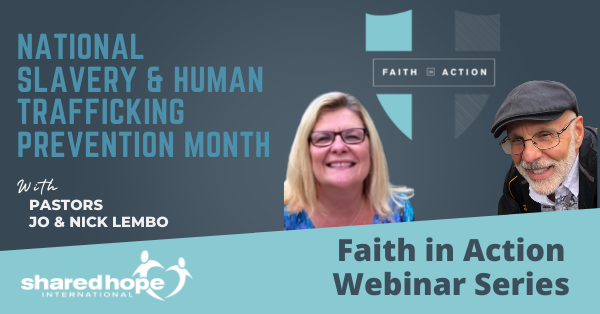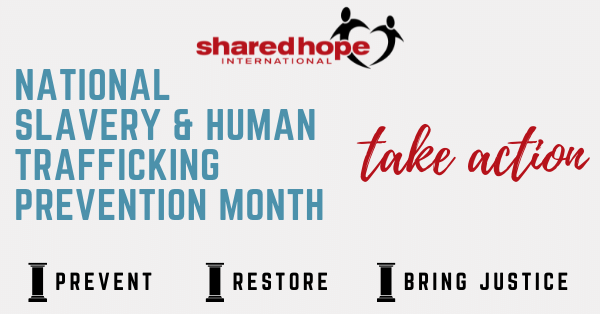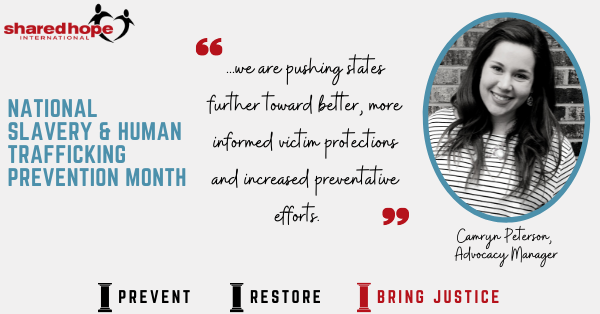By Anna Given

Shared Hope was pleased to have Pastors Jo and Nick Lembo host our Faith in Action webinar series throughout the month of January for National Slavery & Human Trafficking Prevention Month. Jo Lembo is Shared Hope’s Director of Faith Initiatives and Nick Lembo is a member of the Shared Hope Board of Directors and the State Coordinator for Just Men Arizona.
Each week, Jo and Nick walked us through the Faith in Action Kit booklets, sharing a different aspect of anti-human trafficking from the faith perspective. Starting off the series Jo and Nick spoke about transforming the home and community. They discussed how parents can provide protection for their children online and have conversations with their children about their online presence. In this presentation, Jo and Nick spoke directly to why women care about ending child sex trafficking, and Nick shared his perspective on the influence of women from Biblical examples and their powerful influence today.
The next week they discussed promoting an environment of respect. We live in confusing times and there is power in unity! Nick discussed how to be respectful in today’s culture “I don’t want my son to become a predator…” and the on the flip-side, “how do my I prevent my daughter from becoming exploited.” He also shared from his own experience, discussing how he became involved in the fight against child sex trafficking. Jo also shared her side of the story and how they became who they are today.
In our third webinar, Jo and Nick focused on empowering youth and addressed these pressing questions: what are the root issues that cause minor sex trafficking in the USA? “What are kids looking for and why?”, “what are the vulnerabilities of victims,” and “How can I protect my kids from being preyed upon?” They also discussed tips of instilling respect in our children for themselves and others, a challenge in today’s culture that so often seems driven by sex.
During our final webinar Jo and Nick discussed using your influence to engage community leaders. They focused on how we can use our communities to bring justice and reformation when we learn how to tap into our influence. As pastors, both Jo and Nick have experienced the privilege of leading in their community. Each shared their perspective on how to create dialogue with leaders in your community.
Resources:
Faith in Action Kit – Shared Hope International
Here are resources to connect with us and empower you to protect children:
Sign the Defender’s Pledge: https://sharedhope.org/takeaction/become-a-defender/
Be a part of Faith Initiatives all year long to share the hope: https://sharedhope.org/faithinaction/
Pray for our partners around the world: https://sharedhope.org/faithinaction/prayersofhope/
Free Download Slaying the Giant: https://sharedhope.org/free-anti-trafficking-resource-slaying-giant-practical-tools-combatting-sex-trafficking/
Protect children. Share the Warning Signs poster with others https://sharedhope.org/wp-content/uploads/2020/06/SHI_General-Warning-Signs.pdf
Protect Young Eyes: Internet Safety for Families, Schools, and Churches
Educate others. Share free Internet Safety Tools: https://sharedhope.org/what-we-do/prevent/awareness/internetsafety/
Information just for youth: https://youthonline.sharedhope.org/
How to Keep Your Kids Safe Online https://sharedhope.org/wp-content/uploads/2021/01/SHI_InternetSafety_Mini-Guide_1.21.2021.pdf
Support meaningful legislation. Take action here https://act.sharedhope.org/actioncenter








